Ex: https://www.eurasia-rivista.com
Le Edizioni all’insegna del Veltro hanno appena pubblicato un testo di Jean Thiriart, “L’Impero Euro-sovietico da Vladivostok a Dublino”, che era rimasto inedito fin dal 1984. Della sua esistenza il direttore di “Eurasia” aveva dato notizia alcuni anni fa (nella sua Prefazione ad una nuova edizione di “Un Impero di 400 milioni di uomini”).
All’inizio degli anni Ottanta, Thiriart lavora a un libro che non ha mai visto la luce: L’Empire euro-soviétique de Vladivostok à Dublin. Il piano dell’opera prevede quindici capitoli, ciascuno dei quali si articola in numerosi paragrafi. Come appare evidente dal titolo di quest’opera, la posizione di Thiriart nei confronti dell’Unione Sovietica è notevolmente cambiata. Abbandonata la vecchia parola d’ordine “Né Mosca né Washington”, Thiriart assume ora una posizione che potrebbe essere riassunta così: “Con Mosca contro Washington”. Già tredici anni prima, d’altronde, in un articolo intitolato Prague, l’URSS et l’Europe (“La Nation Européenne”, n. 29, novembre 1968), denunciando gli intrighi sionisti nella cosiddetta “primavera di Praga”, Thiriart aveva espresso una certa soddisfazione per l’intervento sovietico e aveva cominciato a delineare una “strategia dell’attenzione” nei confronti dell’URSS. “Un’Europa occidentale NON AMERICANA – aveva scritto – permetterebbe all’Unione Sovietica di svolgere un ruolo quasi antagonista degli USA. Un’Europa occidentale alleata, o un’Europa occidentale AGGREGATA all’URSS sarebbe la fine dell’imperialismo americano (…) Se i Russi vogliono staccare gli Europei dall’America – e a lungo termine essi devono necessariamente lavorare per questo scopo – bisogna che ci offrano, in cambio della SCHIAVITU’ DORATA americana, la possibilità di costruire un’entità politica europea. Se la temono, il modo migliore di scongiurarla consiste nell’integrarvisi”.
Cogliamo l’occasione dalla recente apparizione de “L’Impero Euro-sovietico” per riproporre integralmente lo scritto del direttore di “Eurasia”, che è una rievocazione dell’attività teorica e militante svolta da Jean Thiriart.
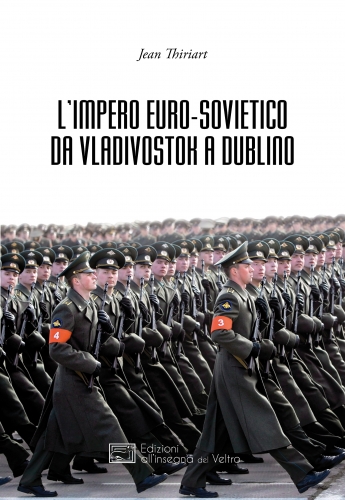
L’IMPERO CHE VERRÀ
L’ultimo ricordo che ho di Jean Thiriart è una lettera che mi scrisse alcuni mesi prima di morire: mi chiedeva di indicargli una località isolata sugli Appennini, dove potersi accampare un paio di settimane per fare qualche escursione sui monti. Quasi settantenne, era ancora pieno di vitalità: non si lanciava più col paracadute, però navigava con la barca a vela sul Mare del Nord.
 Negli anni Sessanta, in qualità di giovanissimo militante della Giovane Europa, l’organizzazione da lui diretta, ebbi modo di vederlo diverse volte. Lo conobbi a Parma, nel 1964, accanto a un monumento che colpì in maniera particolare la sua sensibilità di “eurafricano”: quello di Vittorio Bottego, l’esploratore del corso del Giuba. Poi lo incontrai in occasione di alcune riunioni della Giovane Europa e in un campeggio sulle Alpi. Nel 1967, alla vigilia dell’aggressione sionista contro l’Egitto e la Siria, fui presente a un’affollata conferenza che egli tenne in una sala di Bologna, dove spiegò perché l’Europa doveva schierarsi a fianco del mondo arabo e contro l’entità sionista. Nel 1968, a Ferrara, partecipai a un convegno di dirigenti della Giovane Europa, nel corso del quale Thiriart sviluppò a tutto campo la linea antimperialista: “Qui in Europa, la sola leva antiamericana è e resterà un nazionalismo europeo ‘di sinistra’ (…) Quello che voglio dire è che all’Europa sarà necessario un nazionalismo di carattere popolare (…) Un nazionalcomunismo europeo avrebbe sollevato un’ondata enorme di entusiasmo. (…) Guevara ha detto che sono necessari molti Vietnam; e aveva ragione. Bisogna trasformare la Palestina in un nuovo Vietnam”. Fu l’ultimo suo discorso che ebbi modo di ascoltare.
Negli anni Sessanta, in qualità di giovanissimo militante della Giovane Europa, l’organizzazione da lui diretta, ebbi modo di vederlo diverse volte. Lo conobbi a Parma, nel 1964, accanto a un monumento che colpì in maniera particolare la sua sensibilità di “eurafricano”: quello di Vittorio Bottego, l’esploratore del corso del Giuba. Poi lo incontrai in occasione di alcune riunioni della Giovane Europa e in un campeggio sulle Alpi. Nel 1967, alla vigilia dell’aggressione sionista contro l’Egitto e la Siria, fui presente a un’affollata conferenza che egli tenne in una sala di Bologna, dove spiegò perché l’Europa doveva schierarsi a fianco del mondo arabo e contro l’entità sionista. Nel 1968, a Ferrara, partecipai a un convegno di dirigenti della Giovane Europa, nel corso del quale Thiriart sviluppò a tutto campo la linea antimperialista: “Qui in Europa, la sola leva antiamericana è e resterà un nazionalismo europeo ‘di sinistra’ (…) Quello che voglio dire è che all’Europa sarà necessario un nazionalismo di carattere popolare (…) Un nazionalcomunismo europeo avrebbe sollevato un’ondata enorme di entusiasmo. (…) Guevara ha detto che sono necessari molti Vietnam; e aveva ragione. Bisogna trasformare la Palestina in un nuovo Vietnam”. Fu l’ultimo suo discorso che ebbi modo di ascoltare.
Jean-François Thiriart era nato a Bruxelles il 22 marzo 1922 da una famiglia di cultura liberale originaria di Liegi. In gioventù militò attivamente nella Jeune Garde Socialiste Unifiée e nell’Union Socialiste Anti-Fasciste. Per un certo periodo collaborò col professor Kessamier, presidente della società filosofica Fichte Bund, una filiazione del movimento nazionalbolscevico amburghese; poi, assieme ad altri elementi dell’estrema sinistra favorevoli ad un’alleanza del Belgio col Reich nazionalsocialista, aderì all’associazione degli Amis du Grand Reich Allemand. Per questa scelta, nel 1943 fu condannato a morte dai collaboratori belgi degli Angloamericani: la radio inglese inserì il suo nome nella lista di proscrizione che venne comunicata ai résistants con le istruzioni per l’uso. Dopo la “Liberazione”, nei suoi confronti fu applicato un articolo del Codice Penale belga opportunamente rielaborato a Londra nel 1942 dalle marionette belghe degli Atlantici. Trascorse alcuni anni in carcere e, quando uscì, il giudice lo privò del diritto di scrivere.
Nel 1960, all’epoca della decolonizzazione del Congo, Thiriart partecipa alla fondazione del Comité d’Action et de Défense des Belges d’Afrique, che di lì a poco diventa il Mouvement d’Action Civique. In veste di rappresentante di questo organismo, il 4 marzo 1962 Thiriart incontra a Venezia gli esponenti di altri gruppi politici europei; ne esce una dichiarazione comune, in cui i presenti si impegnano a dar vita a “un Partito Nazionale Europeo, centrato sull’idea dell’unità europea, che non accetti la satellizzazione dell’Europa occidentale da parte degli USA e non rinunci alla riunificazione dei territori dell’Est, dalla Polonia alla Bulgaria passando per l’Ungheria”. Ma il progetto del Partito europeo abortisce ben presto, a causa delle tendenze piccolo-nazionaliste dei firmatari italiani e tedeschi del Manifesto di Venezia.
La lezione che Thiriart trae da questo fallimento è che il Partito europeo non può nascere da un’alleanza di gruppi e movimenti piccolo-nazionali, ma deve essere fin da principio un’organizzazione unitaria su scala europea. Nasce così, nel gennaio 1963, la Giovane Europa (Jeune Europe), un movimento fortemente strutturato che ben presto si impianta in Belgio, Olanda, Francia, Svizzera, Austria, Germania, Italia, Spagna, Portogallo, Inghilterra. Il programma della Giovane Europa si trova esposto nel Manifesto alla Nazione Europea, che esordisce così: “Tra il blocco sovietico e il blocco degli USA, il nostro compito è di edificare una grande Patria: l’Europa unita, potente, comunitaria (…) da Brest sino a Bucarest”. La scelta è a favore di un’Europa decisamente unitaria: “Europa federale o Europa delle Patrie sono delle concezioni che nascondono la mancanza di sincerità e la senilità di coloro che le difendono (…) Noi condanniamo i piccoli nazionalismi che mantengono le divisioni tra i cittadini della NAZIONE EUROPEA”. L’Europa deve optare per una neutralità forte e armata e disporre di una forza atomica propria; deve “ritirarsi dal circo dell’ONU” e sostenere l’America Latina, che “lotta per la sua unità e per la sua indipendenza”. Il Manifesto abbozza un’alternativa ai sistemi sociali vigenti nelle due Europe, proclamando la “superiorità del lavoratore sul capitalista” e la “superiorità dell’uomo sul formicaio”: “Noi vogliamo una comunità dinamica con la partecipazione nel lavoro di tutti gli uomini che la compongono”. Alla democrazia parlamentare e alla partitocrazia viene contrapposto una rappresentanza organica: “un Senato politico, il Senato della Nazione Europea basato sulle province europee e composto delle più alte personalità nel campo della scienza, del lavoro, delle arti e delle lettere; una Camera sindacale che rappresenti gli interessi di tutti i produttori dell’Europa liberata dalla tirannia finanziaria e politica straniera”. Il Manifesto conclude così: “Noi rifiutiamo l’Europa teorica. Noi rifiutiamo l’Europa legale. Noi condanniamo l’Europa di Strasburgo per crimine di tradimento. (…) O vi sarà una NAZIONE o non vi sarà indipendenza. A questa Europa legale che rifiutiamo, noi opponiamo l’Europa legittima, l’Europa dei popoli, la nostra Europa. NOI SIAMO LA NAZIONE EUROPEA”.
Accanto a una scuola per la formazione politica dei militanti (che dal 1966 al 1968 pubblica mensilmente “L’Europe Communautaire”), la Giovane Europa cerca di dar vita a un Sindacato Comunitario Europeo e, nel 1967, a un’associazione universitaria, Università Europea, che sarà attiva particolarmente in Italia. Dal 1963 al 1966 viene pubblicato un organo di stampa in lingua francese, “Jeune Europe” (con frequenza prima settimanale, poi quindicinale); tra i giornali in altre lingue va citato l’italiano “Europa Combattente”, che nel medesimo periodo riesce a raggiungere una frequenza mensile. Dal 1966 al 1968 esce “La Nation Européenne”, mentre in Italia “La Nazione Europea” continuerà ad uscire, a cura dell’autore di queste righe, anche nel 1969 (un ultimo numero sarà pubblicato a Napoli nel 1970 da Pino Balzano).
“La Nation Européenne”, mensile di grande formato che in certi numeri raggiunge la cinquantina di pagine, oltre ai redattori militanti annovera collaboratori di un certo rilievo culturale e politico: il politologo Christian Perroux, il saggista algerino Malek Bennabi, il deputato delle Alpi Marittime Francis Palmero, l’ambasciatore siriano Selim el-Yafi, l’ambasciatore iracheno Nather el-Omari, , i dirigenti del FLN algerino Chérif Belkacem, Si Larbi e Djamil Mendimred, il presidente dell’OLP Ahmed Choukeiri, il capo della missione vietcong ad Algeri Tran Hoai Nam, il capo delle Pantere Nere Stokeley Carmichael, , il fondatore dei Centri d’Azione Agraria principe Sforza Ruspali, i letterati Pierre Gripari e Anne-Marie Cabrini. Tra i corrispondenti permanenti, il professor Souad el-Charkawi (al Cairo) e Gilles Munier (ad Algeri).
Sul numero di febbraio del 1969 appare una lunga intervista rilasciata a Jean Thiriart dal generale Perón, il quale dichiara di leggere regolarmente “La Nation Européenne” e di condividerne totalmente le idee. Dal suo esilio madrileno, l’ex presidente argentino riconosce in Castro e in Guevara i continuatori della lotta per l’indipendenza latinoamericana intrapresa a suo tempo dal movimento giustizialista: “Castro – dice Perón – è un promotore della liberazione. Egli si è dovuto appoggiare ad un imperialismo perché la vicinanza dell’altro imperialismo minacciava di schiacciarlo. Ma l’obiettivo dei Cubani è la liberazione dei popoli dell’America Latina. Essi non hanno altra intenzione se non quella di costituire una testa di ponte per la liberazione dei paesi continentali. Che Guevara è un simbolo di questa liberazione. Egli è stato grande perché ha servito una grande causa, finché ha finito per incarnarla. È l’uomo di un ideale”.
Per quanto riguarda la liberazione dell’Europa, Thiriart pensa a costituire delle Brigate Rivoluzionarie Europee che intraprendano la lotta armata contro l’occupante statunitense. Già nel 1966 egli ha avuto un colloquio col ministro degli Esteri cinese Chu En-lai, a Bucarest, e gli ha chiesto di appoggiare la costituzione di un apparato politico-militare europeo che combatta contro il nemico comune[1]. Nel 1967 l’attenzione di Thiriart si dirige sull’Algeria: “Si può, si deve prendere in considerazione un’azione parallela e auspicare la formazione militare, in Algeria, fin da ora, di una sorta di Reichswehr rivoluzionaria europea. Gli attuali governi di Belgio, Paesi Bassi, Inghilterra, Germania, Italia sono in diversa misura i satelliti, i valletti di Washington; perciò noi nazionaleuropei, noi rivoluzionari europei, dobbiamo andare a formare in Africa i quadri di una futura forza politico-militare che, dopo aver servito nel Mediterraneo e nel Vicino Oriente, un giorno potrà battersi in Europa per farla finita coi Kollabos di Washington. Delenda est Carthago”[2]. Nell’autunno del 1967 Gérard Bordes, direttore de “La Nation Européenne”, si reca in Algeria, dove entra in contatto con la Segreteria Esecutiva del FLN e col Consiglio della Rivoluzione. Nell’aprile del 1968 Bordes ritorna ad Algeri con un Mémorandum à l’intention du gouvernement de la République Algérienne firmato da lui stesso e da Thiriart, nel quale sono contenute le proposte seguenti: “Contributo europeo alla formazione di specialisti in vista della lotta contro Israele; preparazione tecnica della futura azione diretta contro gli Americani in Europa; creazione di un servizio d’informazioni antiamericano e antisionista in vista di un’utilizzazione simultanea nei paesi arabi e in Europa”.
Siccome i contatti con l’Algeria non hanno nessun seguito, Thiriart si rivolge ai paesi arabi del Vicino Oriente. D’altronde, il 3 giugno 1968 un militante di Jeune Europe, Roger Coudroy, è caduto con le armi in pugno sotto il fuoco sionista, mentre con un gruppo di al-Fatah cercava di penetrare nella Palestina occupata.
Nell’autunno del 1968 Thiriart viene invitato dai governi di Bagdad e del Cairo, nonché dal Partito Ba’ath, a recarsi nel Vicino Oriente. In Egitto assiste ai lavori d’apertura del congresso dell’Unione Socialista Araba, il partito egiziano di governo; viene ricevuto da alcuni ministri e ha modo di incontrare lo stesso Presidente Nasser. In Iraq incontra diverse personalità politiche, tra cui alcuni dirigenti dell’OLP, e rilascia interviste a organi di stampa e radiotelevisivi. Ma lo scopo principale del viaggio di Thiriart consiste nell’instaurare una collaborazione che dia luogo alla creazione delle Brigate Europee, le quali dovrebbero partecipare alla lotta per la liberazione della Palestina e diventare così il nucleo di un’Armata di Liberazione Europea. Davanti al rifiuto del governo iracheno, determinato da pressioni sovietiche, questo scopo fallisce. Scoraggiato da questo fallimento e ormai privo di mezzi economici sufficienti a sostenere una lotta politica di un certo livello, Thiriart decide di ritirarsi dalla politica militante.
Dal 1969 al 1981, Thiriart si dedica esclusivamente all’attività professionale e sindacale nel settore dell’optometria, nel quale ricopre importanti funzioni: è presidente della Société d’Optométrie d’Europe, dell’Union Nationale des Optométristes et Opticiens de Belgique, del Centre d’Études des Sciences Optiques Appliquées ed è consigliere di varie commissioni della CEE. Ciononostante, nel 1975 rilascia una lunga intervista a Michel Schneider per “Les Cahiers du Centre de Documentation Politique Universitaire” di Aix-en-Provence ed assiste Yannick Sauveur nella compilazione di una tesi universitaria intitolata Jean Thiriart et le national-communautarisme européen (Università di Parigi, 1978). Quella di Sauveur è la seconda ricerca universitaria dedicata all’attività politica di Thiriart, poiché sei anni prima era stata presentata all’Università Libera di Bruxelles una tesi di Jean Beelen su Le Mouvement d’Action Civique.
Nel 1981, un attentato di teppisti sionisti contro il suo ufficio di Bruxelles induce Thiriart a riprendere l’attività politica. Riallaccia i contatti con un ex redattore della “Nation Européenne”, lo storico spagnolo Bernardo Gil Mugarza[3], il quale, nel corso di una lunga intervista (centootto domande), gli dà modo di aggiornare e di approfondire il suo pensiero politico. Prende forma in tal modo un libro che Thiriart conta di pubblicare in spagnolo e in tedesco, ma che è rimasto finora inedito.
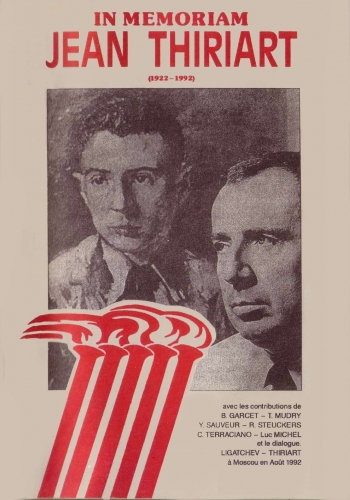 All’inizio degli anni Ottanta, Thiriart lavora a un libro che non ha mai visto la luce: L’Empire euro-soviétique de Vladivostok à Dublin. Il piano dell’opera prevede quindici capitoli, ciascuno dei quali si articola in numerosi paragrafi. Come appare evidente dal titolo di quest’opera, la posizione di Thiriart nei confronti dell’Unione Sovietica è notevolmente cambiata. Abbandonata la vecchia parola d’ordine “Né Mosca né Washington”, Thiriart assume ora una posizione che potrebbe essere riassunta così: “Con Mosca contro Washington”. Già tredici anni prima, d’altronde, in un articolo intitolato Prague, l’URSS et l’Europe (“La Nation Européenne”, n. 29, novembre 1968), denunciando gli intrighi sionisti nella cosiddetta “primavera di Praga”, Thiriart aveva espresso una certa soddisfazione per l’intervento sovietico e aveva cominciato a delineare una “strategia dell’attenzione” nei confronti dell’URSS. “Un’Europa occidentale NON AMERICANA – aveva scritto – permetterebbe all’Unione Sovietica di svolgere un ruolo quasi antagonista degli USA. Un’Europa occidentale alleata, o un’Europa occidentale AGGREGATA all’URSS sarebbe la fine dell’imperialismo americano (…) Se i Russi vogliono staccare gli Europei dall’America – e a lungo termine essi devono necessariamente lavorare per questo scopo – bisogna che ci offrano, in cambio della SCHIAVITU’ DORATA americana, la possibilità di costruire un’entità politica europea. Se la temono, il modo migliore di scongiurarla consiste nell’integrarvisi”.
All’inizio degli anni Ottanta, Thiriart lavora a un libro che non ha mai visto la luce: L’Empire euro-soviétique de Vladivostok à Dublin. Il piano dell’opera prevede quindici capitoli, ciascuno dei quali si articola in numerosi paragrafi. Come appare evidente dal titolo di quest’opera, la posizione di Thiriart nei confronti dell’Unione Sovietica è notevolmente cambiata. Abbandonata la vecchia parola d’ordine “Né Mosca né Washington”, Thiriart assume ora una posizione che potrebbe essere riassunta così: “Con Mosca contro Washington”. Già tredici anni prima, d’altronde, in un articolo intitolato Prague, l’URSS et l’Europe (“La Nation Européenne”, n. 29, novembre 1968), denunciando gli intrighi sionisti nella cosiddetta “primavera di Praga”, Thiriart aveva espresso una certa soddisfazione per l’intervento sovietico e aveva cominciato a delineare una “strategia dell’attenzione” nei confronti dell’URSS. “Un’Europa occidentale NON AMERICANA – aveva scritto – permetterebbe all’Unione Sovietica di svolgere un ruolo quasi antagonista degli USA. Un’Europa occidentale alleata, o un’Europa occidentale AGGREGATA all’URSS sarebbe la fine dell’imperialismo americano (…) Se i Russi vogliono staccare gli Europei dall’America – e a lungo termine essi devono necessariamente lavorare per questo scopo – bisogna che ci offrano, in cambio della SCHIAVITU’ DORATA americana, la possibilità di costruire un’entità politica europea. Se la temono, il modo migliore di scongiurarla consiste nell’integrarvisi”.
A Mosca, Thiriart ci va nell’agosto 1992 assieme a Michel Schneider, direttore della rivista “Nationalisme et République”. A fare gli onori di casa è Aleksandr Dugin, il quale nel marzo dello stesso anno ha accolto Alain de Benoist e Robert Steuckers e in giugno ha intervistato alla TV di Mosca l’autore di queste righe, dopo averlo presentato agli esponenti dell’opposizione “rosso-bruna”. L’attività di Thiriart a Mosca, dove si trovano anche Carlo Terracciano e Marco Battarra, delegati del Fronte Europeo di Liberazione, è intensissima. Tiene conferenze stampa; rilascia interviste; partecipa a una tavola rotonda con Prokhanov, Ligacev, Dugin e Sultanov nella redazione del giornale “Den’”, che pubblicherà sul n. 34 (62) un testo di Thiriart intitolato L’Europa fino a Vladivostok; ha un incontro con Gennadij Zjuganov; si intrattiene con altri esponenti dell’opposizione “rosso-bruna”, tra cui Nikolaj Pavlov e Sergej Baburin; discute con il filosofo e dirigente del Partito della Rinascita Islamica Gejdar Dzemal; partecipa a una manifestazione di studenti arabi per le vie di Mosca.
Il 23 novembre, tre mesi dopo il suo rientro in Belgio, Thiriart è stroncato da una crisi cardiaca.
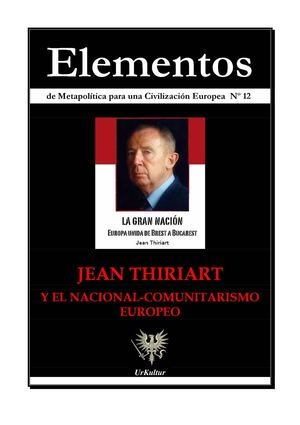 Apparso nel 1964 in lingua francese, nel giro di due anni Un Empire de 400 millions d’hommes: l’Europe vide la luce in altre sei lingue europee. La traduzione italiana venne eseguita da Massimo Costanzo, (all’epoca redattore di “Europa Combattente”, organo italofono della Giovane Europa), il quale presentò l’opera con queste parole: “Il libro di Jean Thiriart è destinato a suscitare, per la sua profondità e per la sua chiarezza, un forte interesse. Ma da dove deriva questa chiarezza? Da un fatto molto semplice: l’autore ha usato un linguaggio essenzialmente politico, lontano dai fumi dell’ideologia e dalle costruzioni astratte o pseudometafisiche. Dopo una lettura attenta, nel libro si possono anche trovare impostazioni ideologiche, ma queste traspaiono dalle tesi politiche e non il contrario, come fino ad oggi è avvenuto nel campo nazionaleuropeo”. Nonostante le riserve che alcune “impostazioni ideologiche” dell’Autore (eurocentrismo, razionalismo, giacobinismo ecc.) potranno suscitare, il lettore di questa seconda edizione italiana probabilmente concorderà con quanto scriveva Massimo Costanzo quarant’anni or sono; anzi, si renderà conto che questo libro, senza dubbio il più famoso dei testi redatti da Thiriart[4], è un libro preveggente ed attuale, per quanto inevitabilmente risenta della situazione storica in cui venne concepito. Preveggente, perché anticipa il crollo del sistema sovietico, e questo una decina d’anni prima dell’”eurocomunismo”; attuale, perché la descrizione dell’egemonia statunitense in Europa è ancor oggi un dato reale; anzi, l’analisi thiriartiana dell’imperialismo si avvale della lettura di un autore come James Burnham, che già negli anni Sessanta candidava gli USA al dominio mondiale assoluto.
Apparso nel 1964 in lingua francese, nel giro di due anni Un Empire de 400 millions d’hommes: l’Europe vide la luce in altre sei lingue europee. La traduzione italiana venne eseguita da Massimo Costanzo, (all’epoca redattore di “Europa Combattente”, organo italofono della Giovane Europa), il quale presentò l’opera con queste parole: “Il libro di Jean Thiriart è destinato a suscitare, per la sua profondità e per la sua chiarezza, un forte interesse. Ma da dove deriva questa chiarezza? Da un fatto molto semplice: l’autore ha usato un linguaggio essenzialmente politico, lontano dai fumi dell’ideologia e dalle costruzioni astratte o pseudometafisiche. Dopo una lettura attenta, nel libro si possono anche trovare impostazioni ideologiche, ma queste traspaiono dalle tesi politiche e non il contrario, come fino ad oggi è avvenuto nel campo nazionaleuropeo”. Nonostante le riserve che alcune “impostazioni ideologiche” dell’Autore (eurocentrismo, razionalismo, giacobinismo ecc.) potranno suscitare, il lettore di questa seconda edizione italiana probabilmente concorderà con quanto scriveva Massimo Costanzo quarant’anni or sono; anzi, si renderà conto che questo libro, senza dubbio il più famoso dei testi redatti da Thiriart[4], è un libro preveggente ed attuale, per quanto inevitabilmente risenta della situazione storica in cui venne concepito. Preveggente, perché anticipa il crollo del sistema sovietico, e questo una decina d’anni prima dell’”eurocomunismo”; attuale, perché la descrizione dell’egemonia statunitense in Europa è ancor oggi un dato reale; anzi, l’analisi thiriartiana dell’imperialismo si avvale della lettura di un autore come James Burnham, che già negli anni Sessanta candidava gli USA al dominio mondiale assoluto.
Nella mia biblioteca conservo un esemplare della prima edizione di questo libro (“édité à Bruxelles, par Jean Thiriart, en Mai 1964”). La dedica che l’Autore vi scrisse di suo pugno contiene un’esortazione di cui vorrei si appropriassero i lettori delle nuove generazioni, questa: “Votre jeunesse est belle. Elle a devant elle un Empire à bâtir“. Diversamente da Luttwak e da Toni Negri, Thiriart sapeva bene che l’Impero è l’esatto contrario dell’imperialismo e che gli Stati Uniti non sono Roma, bensì Cartagine.
NOTE
[1] Nel 1985 Thiriart rievocò l’episodio nei termini seguenti. “Nella sua fase iniziale, il mio incontro con Chou En-lai non fu che uno scambio di aneddoti e ricordi. Chou En-lai si interessò ai miei studi sulla scrittura cinese ed io al suo soggiorno in Francia che per lui rappresentava un gradevole ricordo giovanile. La conversazione si orientò poi sul tema degli eserciti popolari – tema caro tanto a lui quanto a me. Le cose si guastarono quando progressivamente si arrivò al concreto. Dovetti subire allora un vero e proprio corso di catechismo marxista-leninista. Chou stese poi l’inventario dei vari errori psicologici commessi dall’Unione Sovietica. E la lezione si spostò sulle nozioni di ‘alleanza gerarchica’ e ‘alleanza egualitaria’. Per distendere l’ambiente, affrontai il tema dei disordini che avevo organizzato a Vienna nel 1961, durante l’incontro Krusciov-Kennedy. Ma il tentativo di fargli accettare il concetto della lotta globale quadricontinentale di tutte le forze anti-americane nel mondo, quali che siano i loro orientamenti ideologici, fallì. Attirai a tal scopo la sua attenzione sul fatto che era anche l’opinione del generale Peròn, un amico di lunga data. Si inalberò un po’ quando gli feci notare che in Argentina Peròn – sul piano psicologico – era una forza incommensurabilmente più forte che il comunismo. Io sono un uomo pragmatico. Gli domandai dunque dei mezzi – del denaro per sviluppare la nostra stampa ed un santuario per la nostra organizzazione – per la preparazione e la strutturazione di un apparato politico-militare rivoluzionario europeo. Mi rinviò ai suoi servizi. Il solo risultato fu, alla fine dell’incontro, un eccellente pranzo, consumato in un clima molto disteso. Ricomparvero allora gli ufficiali rumeni, che non avevano assistito agli incontri politici. In seguito, non riuscii ad ottenere nulla dai servizi cinesi, la cui incomprensione dell’Europa era totale sia sul piano psicologico che su quello politico” (Da Jeune Europe alle Brigate Rosse. Antiamericanismo e logica dell’impegno rivoluzionario, Società Editrice Barbarossa, Milano 1992, pp. 24-25).
[2] J. Thiriart, USA: un empire de mercantis, “La Nation Européenne”, 21, ottobre 1967, p. 7.
[3] Autore di España en llamas 1936, Acervo, Barcelona 1968.
[4] Oltre a questo libro, Thiriart pubblicò anche La Grande Nation. 65 thèses sur l’Europe, Bruxelles 1965 (ed. it. La Grande Nazione. 65 tesi sull’Europa, Milano s. d.; 2° ed. italiana Società Editrice Barbarossa, Milano 1993; ed. tedesca Das Vierte Reich: Europa, Bruxelles 1966). Nel 1967 Thiriart progettò un libro intitolato Libération et unification de l’Europe. L’incarico di redigere gli ottocento paragrafi di questa opera venne assegnato a un collettivo composto di redattori della “Nation Européenne”.



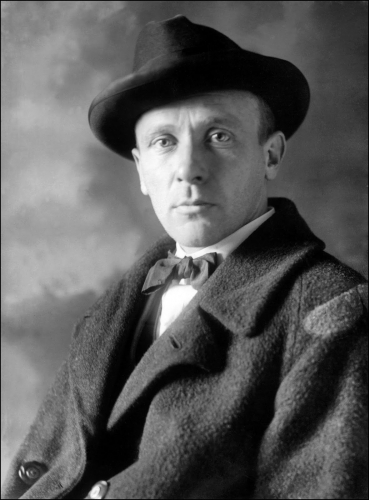
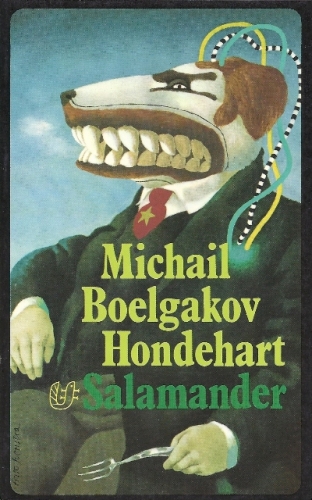 Wie mijn boekbesprekingen volgt, zal zich misschien herinneren dat ik er eind augustus 2019 (het lijkt alweer een eeuwigheid geleden) een publiceerde over een ander werk van
Wie mijn boekbesprekingen volgt, zal zich misschien herinneren dat ik er eind augustus 2019 (het lijkt alweer een eeuwigheid geleden) een publiceerde over een ander werk van 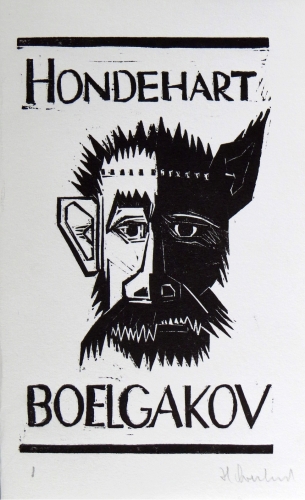 Zo, om de clue te weten te komen, moet u het boekje al niet meer lezen, maar u zal allicht ook niet meer opkijken van het feit dat dit werk in de Sovjet-Unie niet mocht gepubliceerd worden (helaas dook het in het Westen ook pas op toen hij al overleden was, net zoals De Meester en Margarita trouwens). Een duidelijker kritiek op het idee van de maakbare mens is nauwelijks denkbaar. En daarmee vormt het boek eigenlijk net zo goed een aanklacht tegen het nationaal-socialisme of tegen volstrekt waanzinnige moderne vormen van utopieën genre de veelbesproken Great Reset. Je kan de mens wel uit het vuilnis halen, maar niet het vuilnis uit de mens. Je kan de mens proberen aan te passen aan je communistische, nationaal-socialistische, post-modernistische ideetjes, maar de mens zal altijd een mens blijven en zelfs als er geen externe factoren meespelen – iets waar mensen als Klaus Schwab vurig naar streven door de hele wereld mee te slepen in hun waanzin –, zal je utopie aan dat simpele feit ten onder gaan.
Zo, om de clue te weten te komen, moet u het boekje al niet meer lezen, maar u zal allicht ook niet meer opkijken van het feit dat dit werk in de Sovjet-Unie niet mocht gepubliceerd worden (helaas dook het in het Westen ook pas op toen hij al overleden was, net zoals De Meester en Margarita trouwens). Een duidelijker kritiek op het idee van de maakbare mens is nauwelijks denkbaar. En daarmee vormt het boek eigenlijk net zo goed een aanklacht tegen het nationaal-socialisme of tegen volstrekt waanzinnige moderne vormen van utopieën genre de veelbesproken Great Reset. Je kan de mens wel uit het vuilnis halen, maar niet het vuilnis uit de mens. Je kan de mens proberen aan te passen aan je communistische, nationaal-socialistische, post-modernistische ideetjes, maar de mens zal altijd een mens blijven en zelfs als er geen externe factoren meespelen – iets waar mensen als Klaus Schwab vurig naar streven door de hele wereld mee te slepen in hun waanzin –, zal je utopie aan dat simpele feit ten onder gaan.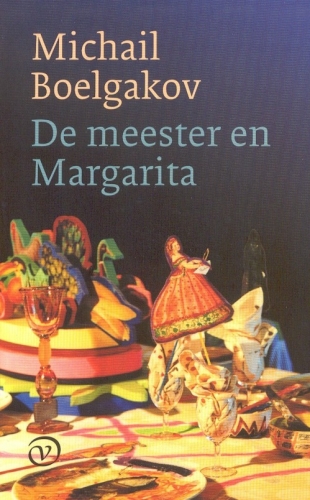 Gevolgd door een hoofdstuk waarin het beest de operatiekamer ingelokt wordt en de chirurg er behalve wat worst ook een stukje filosofie tegenaan gooit als hij door zijn assistent gevraagd wordt hoe hij de hond heeft meegekregen: “Kwestie van aanhalen. Dat is de enige manier waarop je wat bereikt bij levende wezens. Met terreur kom je nergens, ongeacht het ontwikkelingspeil van een dier.” Waarna dat dier ook te weten komt dat hij dan wel nieuwe testikels heeft gekregen, maar ook ontmand is: “‘Pas op, jij, of ik maak je af! Weest u maar niet bang, hij bijt niet.’ ‘Bijt ik niet?’ vroeg de hond zich verbaasd af.” En waarin we kennis maken met het “huisbestuur”, de club van communistische zeloten die ervoor moeten zorgen dat Preobrazjenski datgene doet wat ook in
Gevolgd door een hoofdstuk waarin het beest de operatiekamer ingelokt wordt en de chirurg er behalve wat worst ook een stukje filosofie tegenaan gooit als hij door zijn assistent gevraagd wordt hoe hij de hond heeft meegekregen: “Kwestie van aanhalen. Dat is de enige manier waarop je wat bereikt bij levende wezens. Met terreur kom je nergens, ongeacht het ontwikkelingspeil van een dier.” Waarna dat dier ook te weten komt dat hij dan wel nieuwe testikels heeft gekregen, maar ook ontmand is: “‘Pas op, jij, of ik maak je af! Weest u maar niet bang, hij bijt niet.’ ‘Bijt ik niet?’ vroeg de hond zich verbaasd af.” En waarin we kennis maken met het “huisbestuur”, de club van communistische zeloten die ervoor moeten zorgen dat Preobrazjenski datgene doet wat ook in 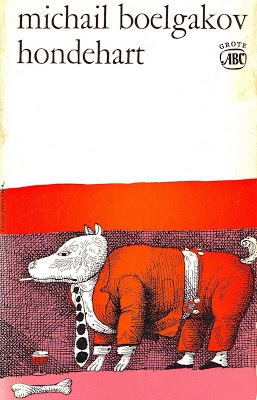 Soit, verder naar het volgende hoofdstuk. Daarin begint de langzame transformatie van hond tot mens (of van mens tot de nationaal-socialistische versie van Nietzsches Übermensch, of van koelak tot communist) en leert het beest dat het goed is geketend te zijn. Liever een dikke hond aan de ketting dan een magere wolf in het bos. “De volgende dag kreeg de hond een brede, glimmende halsband om. Toen hij zich in de spiegel bekeek, was hij het eerste moment knap uit zijn humeur. Met de staart tussen de poten trok hij zich in de badkamer terug, zich afvragend hoe hij het ding zou kunnen doorschuren tegen een kist of een hutkoffer. Maar algauw drong het tot hem door dat hij gewoon een idioot was. Zina nam hem aan de lijn mee uit wandelen door de Oboechovlaan. De hond liep erbij als een arrestant en brandde van schaamte. Maar eenmaal voorbij de Christuskerk op de Pretsjistenka was hij er al helemaal achter wat een halsband in dit leven betekent. Bezeten afgunst stond te lezen in de ogen van alle honden die hij tegen kwam en ter hoogte van het Dodenpad blafte een uit zijn krachten gegroeide straatkeffer hem uit voor ‘rijkeluisflikker’ en ‘zespoot’. Toen zij de tramrails overhuppelden keek een agent van milietsie tevreden en met respect naar de halsband (…) Zo’n halsband is net een aktentas, grapte de hond in gedachte en wiebelend met zijn achterwerk schreed hij op naar de bel-etage als een heer van stand.” Of, zoals het in het volgende hoofdstuk al heet: “Maak je zelf maar niets wijs, jij zoekt heus de vrijheid niet meer op, treurde de hond snuivend. Die ben je ontwend. Ik ben een voornaam hondedier, een intelligent wezen, ik heb een beter bestaan leren kennen. En wat is de vrijheid helemaal? Rook, een fictie, een drogbeeld, anders niet … Een koortsdroom van die rampzalige democraten …”
Soit, verder naar het volgende hoofdstuk. Daarin begint de langzame transformatie van hond tot mens (of van mens tot de nationaal-socialistische versie van Nietzsches Übermensch, of van koelak tot communist) en leert het beest dat het goed is geketend te zijn. Liever een dikke hond aan de ketting dan een magere wolf in het bos. “De volgende dag kreeg de hond een brede, glimmende halsband om. Toen hij zich in de spiegel bekeek, was hij het eerste moment knap uit zijn humeur. Met de staart tussen de poten trok hij zich in de badkamer terug, zich afvragend hoe hij het ding zou kunnen doorschuren tegen een kist of een hutkoffer. Maar algauw drong het tot hem door dat hij gewoon een idioot was. Zina nam hem aan de lijn mee uit wandelen door de Oboechovlaan. De hond liep erbij als een arrestant en brandde van schaamte. Maar eenmaal voorbij de Christuskerk op de Pretsjistenka was hij er al helemaal achter wat een halsband in dit leven betekent. Bezeten afgunst stond te lezen in de ogen van alle honden die hij tegen kwam en ter hoogte van het Dodenpad blafte een uit zijn krachten gegroeide straatkeffer hem uit voor ‘rijkeluisflikker’ en ‘zespoot’. Toen zij de tramrails overhuppelden keek een agent van milietsie tevreden en met respect naar de halsband (…) Zo’n halsband is net een aktentas, grapte de hond in gedachte en wiebelend met zijn achterwerk schreed hij op naar de bel-etage als een heer van stand.” Of, zoals het in het volgende hoofdstuk al heet: “Maak je zelf maar niets wijs, jij zoekt heus de vrijheid niet meer op, treurde de hond snuivend. Die ben je ontwend. Ik ben een voornaam hondedier, een intelligent wezen, ik heb een beter bestaan leren kennen. En wat is de vrijheid helemaal? Rook, een fictie, een drogbeeld, anders niet … Een koortsdroom van die rampzalige democraten …”
 del.icio.us
del.icio.us
 Digg
Digg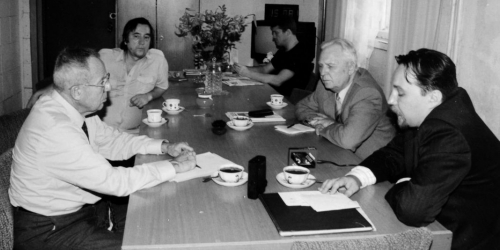
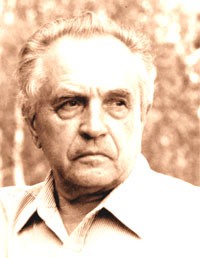 Students and observers of communism consistently encounter the same paradox: On the one hand they attempt to predict the future of communism, yet on the other they must regularly face up to a system that appears unusually static. At Academic gatherings and seminars, and in scholarly treatises, one often hears and reads that communist systems are marred by economic troubles, power sclerosis, ethnic upheavals, and that it is only a matter of time before communism disintegrates. Numerous authors and observers assert that communist systems are maintained in power by the highly secretive nomenklatura, which consists of party potentates who are intensely disliked by the entire civil society. In addition, a growing number of authors argue that with the so-called economic linkages to Western economies, communist systems will eventually sway into the orbit of liberal democracies, or change their legal structure to the point where ideological differences between liberalism and communism will become almost negligible.
Students and observers of communism consistently encounter the same paradox: On the one hand they attempt to predict the future of communism, yet on the other they must regularly face up to a system that appears unusually static. At Academic gatherings and seminars, and in scholarly treatises, one often hears and reads that communist systems are marred by economic troubles, power sclerosis, ethnic upheavals, and that it is only a matter of time before communism disintegrates. Numerous authors and observers assert that communist systems are maintained in power by the highly secretive nomenklatura, which consists of party potentates who are intensely disliked by the entire civil society. In addition, a growing number of authors argue that with the so-called economic linkages to Western economies, communist systems will eventually sway into the orbit of liberal democracies, or change their legal structure to the point where ideological differences between liberalism and communism will become almost negligible. 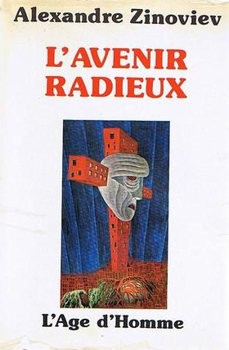 Zinoviev refutes the widespread belief that communist power is vested only among party officials, or the so-called nomenklatura. As dismal as the reality of communism is, the system must be understood as a way of life shared by millions of government official, workers, and countless ordinary people scattered in their basic working units, whose chief function is to operate as protective pillars of the society. Crucial to the stability of the communist system is the blending of the party and the people into one whole, and as Zinoviev observes, “the Soviet saying the party and the people are one and the same, is not just a propagandistic password.” The Communist Party is only the repository of an ideology whose purpose is not only to further the objectives of the party members, but primarily to serve as the operating philosophical principle governing social conduct. Zinoviev remarks that Catholicism in the earlier centuries not only served the Pope and clergy; it also provided a pattern of social behavior countless individuals irrespective of their personal feelings toward Christian dogma. Contrary to the assumption of liberal theorists, in communist societies the cleavage between the people and the party is almost nonexistent since rank-and-file party members are recruited from all walks of life and not just from one specific social stratum. To speculate therefore about a hypothetical line that divides the rulers from the ruled, writes Zinoviev in his usual paradoxical tone, is like comparing how “a disemboweled and carved out animal, destined for gastronomic purposes, differs from its original biological whole.”
Zinoviev refutes the widespread belief that communist power is vested only among party officials, or the so-called nomenklatura. As dismal as the reality of communism is, the system must be understood as a way of life shared by millions of government official, workers, and countless ordinary people scattered in their basic working units, whose chief function is to operate as protective pillars of the society. Crucial to the stability of the communist system is the blending of the party and the people into one whole, and as Zinoviev observes, “the Soviet saying the party and the people are one and the same, is not just a propagandistic password.” The Communist Party is only the repository of an ideology whose purpose is not only to further the objectives of the party members, but primarily to serve as the operating philosophical principle governing social conduct. Zinoviev remarks that Catholicism in the earlier centuries not only served the Pope and clergy; it also provided a pattern of social behavior countless individuals irrespective of their personal feelings toward Christian dogma. Contrary to the assumption of liberal theorists, in communist societies the cleavage between the people and the party is almost nonexistent since rank-and-file party members are recruited from all walks of life and not just from one specific social stratum. To speculate therefore about a hypothetical line that divides the rulers from the ruled, writes Zinoviev in his usual paradoxical tone, is like comparing how “a disemboweled and carved out animal, destined for gastronomic purposes, differs from its original biological whole.” 